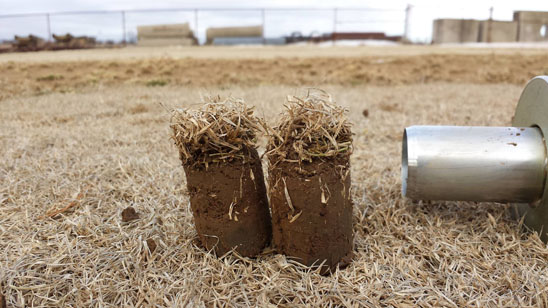Some grasses’ condition questionable after cold winter
Some grasses’ condition questionable after cold winter

Published on March 10, 2014
With spring on the horizon, many Kentuckians are ready to forget about the winter of 2014. However, this spring homeowners and sports turf managers may see some lingering effects of winter in their grasses, said Gregg Munshaw, extension turf specialist with the University of Kentucky College of Agriculture, Food and Environment.
“What it all boils down to is that we live in the heart of the transition zone," he said. “There is never a guarantee that warm-season grasses will make it through our winters. It’s been since 1998 that we had any significant loss of bermudagrass in Kentucky, so we tend to forget that it happens.”
Warm-season grasses like bermudagrass and zoysiagrass do not have the cold tolerance cool-season varieties possess. While bermudagrass is used extensively in sports turf, it’s a weed in many cool-season homeowners’ lawns. If the grass died during the cold weather, it could be a relief to some.
“I suspect the cool-season grasses will all be fine,” Munshaw said. “Kentucky bluegrass and creeping bentgrass both have excellent cold tolerance, and tall fescue has fair cold tolerance.”
It’s been the coldest winter that Kentucky has had for several years. Lexington’s actual air temperature dipped below zero four days in January with the coldest being minus 6 degrees Jan. 22.
“Certainly cold temperatures can lead to warm-season grass loss, but the length of the cold snap is a critical part of the puzzle,” Munshaw said. “Soil is an excellent buffer of temperature. It takes a long time to warm up in the summer and a long time to cool down in the winter.”
Fortunately, plant rhizomes, the underground part of the plant’s stem from which the roots grow, are encased in a medium that is typically warmer than the air temperature. Snow provides excellent insulation as it slows the loss of heat from the soil, but prolonged cold air temperatures can eventually cause the soil to get cold and negatively impact the rhizomes.
Other factors can come into play with winterkill of grasses. Wet and dry soils, wind, north-facing slopes, excessive thatch, shade, prolonged ice cover, warming and cooling periods, cultivar selection and excessive traffic can contribute to warm-season grass loss. The more of the above factors, the greater the chance that grasses will experience winterkill.
Individuals concerned about winterkill can follow a few simple steps to check the health of their grasses. Remove a few grass and soil samples with a cup-cutter, and bring them inside. Place them in pots, either in a warm, sunny window or below a 100-watt bulb. A couple of weeks should provide an indication of grass health.
Fabric turf covers will always help warm-season grasses survive harsh winters. A good article on winter covers is available on the UK Turf Web page at: http://www.uky.edu/Ag/ukturf/winter%20turf%20covers.pdf.
At UK’s Spindletop Research Farm, Munshaw covered some of the warm-season greens’ grasses with lightweight black woven covers and monitored the temperatures underneath them.
“When the air temperature hit 6 below zero, the temperature under the cover was 16degrees above zero,” Munshaw said. “This is a huge difference, but 16degrees is still plenty cold enough to kill bermudagrass.”
Those who need to re-establish a lawn should not apply a pre-emergent herbicide. These herbicides work just as well on desirable grasses as non-desirables. Individuals can use quinclorac or MSMA (golf and sod only) for post-emergence crabgrass control. For those who want to add vegetative plantings, the only pre-emergent herbicide available is oxadiazon. Most of the other common pre-emergent herbicides will cause root pruning and hinder the spread of warm-season grasses.
Extension

